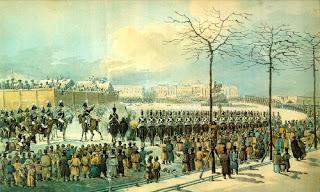In the years 1830 and 1848
revolutions sprung up all across Europe. Liberals and radicals from several
different countries wanted a constitutional monarchy, and, in some cases, no
monarchy at all. Another thing these revolutions have in common is they are
generally regarded by historians as failures. This is true of the revolutions
because they only achieved change temporarily, if at all, before the
conservative ways were restored and many revolutions were very violent.
 |
| The Decembrist Revolt |
One failed revolution, the
biggest failure of all, was the Decembrist Revolt in Russia in 1825. In this
revolution, liberals attempted to overthrow Tsar Nicholas I and create a
constitution. This revolution was poorly planned and organized and failed
miserably. No change was achieved at all and the revolt was very violent for
the short time before it was crushed. As Nicholas I said, “The leaders and the
instigators of the conspiracy will be dealt with without pity, without mercy”
and he did deal with them harshly, killing or imprisoning most. The revolt was
crushed entirely. Another failed revolution was the Polish Revolution of 1830. In
this revolution, nationalists wanted independence from Russia. Poland did gain
independence for 5 months, but it was then taken back under Russian control and
no permanent change was achieved. Tsar Nicholas writes in March 1832, “an end
has been put by force of arms to the rebellion in Poland, and that nation, led
away by agitators, has returned to its duty, and is restored to tranquility.”
Everything returned back to the way it was before the Polish revolution. The
Hungarian Revolution of 1848 was also a failure. This revolution was also led
by nationalists. They wanted to form a government independent from Austria,
abolish serfdom, and also write a constitution. The feeling that “the future of
Hungary can never be secured while Austria maintains a system of government in
direct antagonism to every constitutional principle” led Hungarians to
revolution. The revolutionaries actually had enough power that Metternich fled
and Austria allowed reforms. However, not long after, Russia intervened and
crushed the revolution. In all of these revolutions, permanent change was not
achieved and instead the revolutions were crushed violently. It is for these
reasons that the revolutions of 1830 and 1848 were failures; a revolution
cannot be successful if nothing is changed.
No comments:
Post a Comment